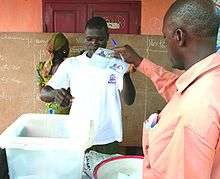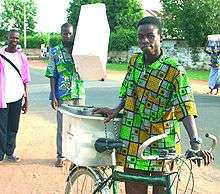Beninese presidential election, 2006
 |
| This article is part of a series on the politics and government of Benin |
|
Government |
|
Parliament |
| Foreign relations |


Presidential elections were held in Benin on 5 March 2006. Long-time president Mathieu Kérékou was barred from running again by a two-term limit and an age limit of 70 years for candidates; in July 2005 he signalled that he would not seek to change the constitution, as has been done in some other African countries, so that he could run again. Kérékou's long-time rival Nicéphore Soglo was also barred from standing due to his age.[1] With both of the men who had been the country's leading political figures for many years unable to contest the election, it had a level of openness and unpredictability that is uncommon to African presidential elections. Since no candidate won a majority, a second round was held between the two leading candidates on 19 March; Yayi Boni won the election and took office in April.
Candidates
A total of 33 candidate applications were registered with the Autonomous National Electoral Commission (CENA). In a ruling issued on 30 January 2006, the Constitutional Court accepted 26 candidacies, as the candidacies of Daniel Shalom, Vincent Emmanuel Ahounou, and Adébayo Ananie were rejected because they were deemed medically unfit for the presidency, while the candidacies of Lary Egoundoukpè and Alidou Tamama were rejected because they had not paid the deposit of five million CFA francs required of candidates. Another two candidates, Edgar Alias and Yaro Sourakatou, withdrew in favor of Boni prior to the ruling. The approved candidates included three serving members of Kérékou's government: Zul Kifl Salami, Antoine Dayori, and Kamarou Fassassi. Additionally, the Constitutional Court approved the candidacies of two heads of major institutions: those of Antoine Idji Kolawolé, the President of the National Assembly, and Raphiou Toukourou, the President of the Economic and Social Council.[2]
Results
In the first round, held on 5 March, Boni, former chairman of the West African Development Bank, placed first with around 35% of the vote, and former President of the National Assembly Adrien Houngbédji of the Democratic Renewal Party placed second with around 24% of the vote. In third place was the Social Democratic Party's candidate Bruno Amoussou, a former speaker of parliament and planning minister who obtained around 16% of the vote, and in fourth place was Benin Renaissance candidate Lehady Soglo, son of former president Nicéphore Soglo, with around 8% of the vote. Boni was an independent candidate, and this was his first election; Houngbédji and Amoussou had both run for president three previous times.[3][4]
Shortly after results were announced in mid-March, the government set the date for the second round between Boni and Houngbédji for 19 March. The country's election commission asked for more time, but this was refused. Boni was backed for the second round by both Amoussou and Soglo.[5] He won the second round with almost 75% of the vote[3] and was sworn in on 6 April.[6]
| Candidate | Party | First round | Second round | ||
|---|---|---|---|---|---|
| Votes | % | Votes | % | ||
| Yayi Boni | Independent | 1,074,308 | 35.78 | 1,979,305 | 74.60 |
| Adrien Houngbédji | Democratic Renewal Party | 727,239 | 24.22 | 673,937 | 25.40 |
| Bruno Amoussou | Social Democratic Party | 489,122 | 16.29 | ||
| Léhadi Soglo | Benin Rebirth Party | 253,478 | 8.44 | ||
| Antoine Kolawolé Idji | African Movement for Development and Progress | 97,595 | 3.25 | ||
| Lazare Sèhouéto | Movement for the People's Alternative | 61,195 | 2.04 | ||
| Sévérin Adjovi | Liberal Democrats' Rally for National Reconstruction – Vivoten | 53,304 | 1.78 | ||
| Antoine Dayori | Hope Force | 37,436 | 1.25 | ||
| Kamarou Fassassi | Awakening Party of Democrats of the New Generation | 29,494 | 0.98 | ||
| Janvier Yahouédéhou | Independent | 23,054 | 0.77 | ||
| Luc Gnacadja | Envol Movement | 20,269 | 0.68 | ||
| Daniel Tawéma | Action Front for Renewal and Development | 18,125 | 0.60 | ||
| Ibrahima Idrissou | Rally for National Unity and Democracy | 18,106 | 0.60 | ||
| Richard Sènou | Independent | 15,672 | 0.52 | ||
| Soulé Dankoro | Democratic Party | 9,929 | 0.33 | ||
| Marie-Elise Gbèdo | Independent | 9,815 | 0.33 | ||
| Célestine Zanou | Independent | 9,474 | 0.32 | ||
| Lionel Agbo | African Congress of Democrats | 9,026 | 0.30 | ||
| Zul Kifl Salami | Independent | 8,538 | 0.28 | ||
| Richard Adjaho | Independent | 7,448 | 0.25 | ||
| Gatien Houngbédji | Democratic Union for Economic and Social Development | 6,544 | 0.22 | ||
| Adolphe Djimon Hodonou | Independent | 6,512 | 0.22 | ||
| Galiou Soglo | Independent | 5,243 | 0.17 | ||
| Léandre Djagoué | Rally of Liberal Democrats – Hêviosso | 4,665 | 0.15 | ||
| Marcel Gbaguidi | Independent | 3,479 | 0.12 | ||
| Raphiou Toukourou | Independent | 3,419 | 0.11 | ||
| Invalid/blank votes | 186,777 | – | 69,564 | – | |
| Total | 3,189,266 | 100 | 2,722,806 | 100 | |
| Registered voters/turnout | 3,917,865 | 81.7 | 3,919,550 | 69.5 | |
| Source: African Elections Database | |||||
References
- ↑ Kerekou says will retire next year, will not change constitution to stay in power IRIN, 12 July 2005
- ↑ La Cour constitutionnelle retient 26 candidatures Archived March 20, 2008, at the Wayback Machine. Panapress, 30 January 2006 (French)
- 1 2 Elections in Benin African Elections Database
- ↑ Profiles of front-runners in presidential race IRIN, 3 March 2006
- ↑ Rejecting appeal, government sets poll for 19 March IRIN, 18 March 2006
- ↑ Virgile Ahissou, Celebrations in Benin as Boni takes office Associated Press, 7 April 2006
External links
- Achieving Transformational Democracy in Africa: Benin strikes again USAID
- Yayi Boni's Official Campaign Website (French)
- Official Website of Adrien Houngbedji (French)
- Commission Electoral Nationale Autonome (French)